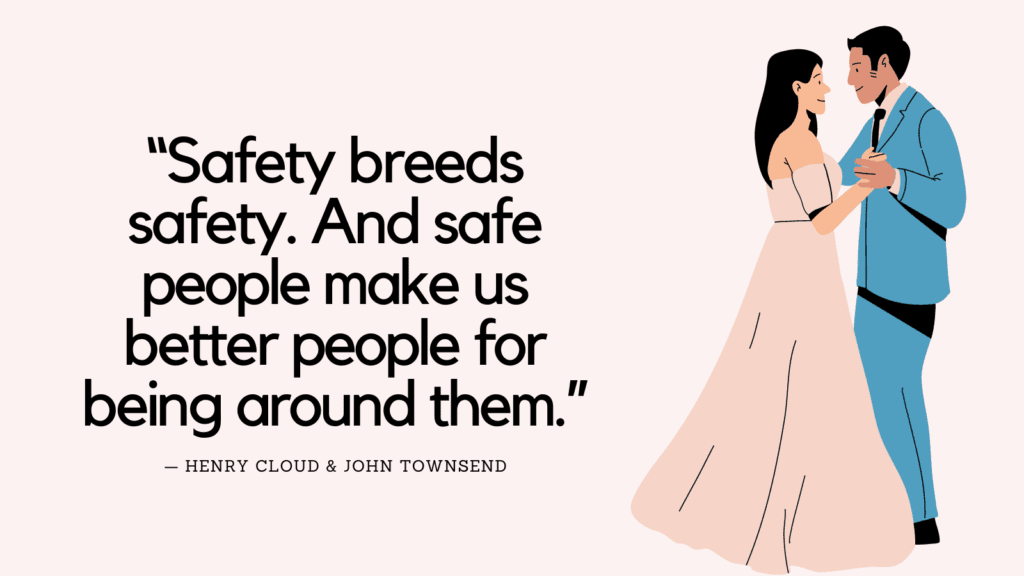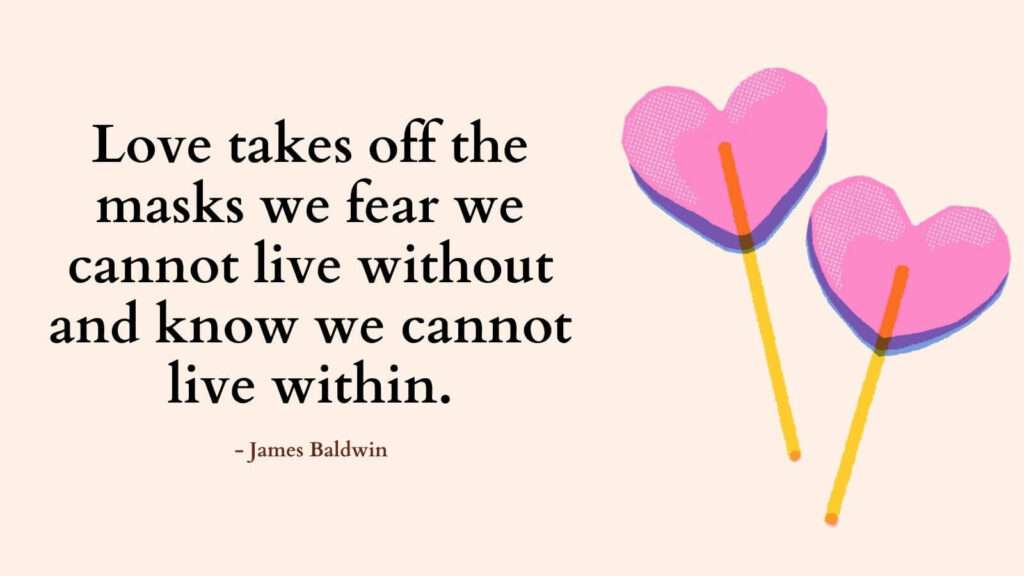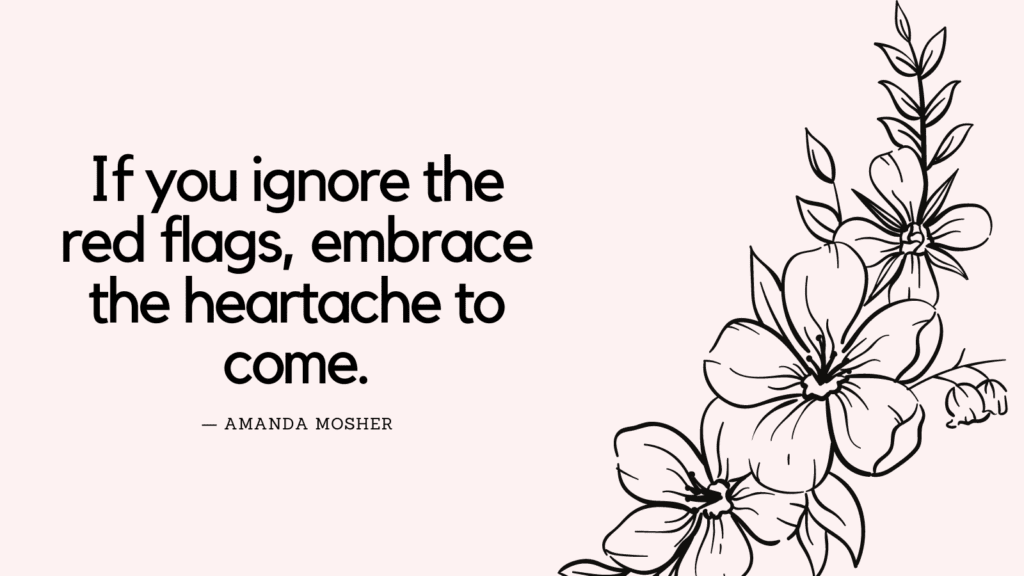This post contains some of the best relationship security quotes.
Relationship Security Quotes
1. “A safe connection involves two people trusting, opening up, and being honest with each other. Yet the second great theme of relationship, after connection, is separateness.”—Henry Cloud & John Townsend
2. “Safe people encourage, value, and nurture the separateness of other people. They understand that they need their own free choices—and that they need to protect the freedom of other people, too.”—Henry Cloud & John Townsend
3. “This relational trait is a little more difficult to spot than the previous one. That’s because an unsafe person can make you feel very, very good. And a safe person can make you feel very, very bad. It can get confusing. How can you tell the difference?”—Henry Cloud & John Townsend
4. “If we have no place to learn about dependable, safe people, we will never be able to sustain ourselves.”—Henry Cloud & John Townsend
Related: How To Fix Anxious Attachment Style In 5 Steps
5. “That’s how envy can spoil safety. Envy makes us resent people who have something we don’t have. It feeds on itself and is ultimately self-destructive. When we envy, the very people who are loving, safe, and generous become the bad guys in our eyes.”—Henry Cloud & John Townsend
6. “Obviously, entitlement destroys safety, because no normal human can fulfill our demands! It’s impossible to love an entitled person, as some fault, empathic misstep, or insensitivity will send the entire relationship tumbling down. The entitled person must be listened to and understood perfectly at all times, or she feels injured and wounded. The end result is isolation.”—Henry Cloud & John Townsend
7. “Safe relationships are not just about trust, support, and sharing. They are also about truth, righteousness, and honesty.”—Henry Cloud & John Townsend
8. “Depending on how young you were, how important the person was to you, and your other resources, you might have lost some of the ability to reach out, to trust, and to find safe people. A deep part of the heart might have felt, “If I love again, I’ll lose again. It’s better to stay apart.” Sometimes we can live all our lives under that cloud of loss.”—Henry Cloud & John Townsend
Related: How To Overcome Avoidant Attachment Style?
9. “How does envy destroy our safety? By spoiling any chance to be loved. When we envy, we resent those who have something to offer us. And, if they do give us something we need, envy makes us (1) devalue what we just got, because our need is insatiable, and (2) resent the giver, because he or she could have always given more.”—Henry Cloud & John Townsend
10. “Be aware that when you’re hurting, a voice may tell you, “Why bother others? They’ll see how weak you are. Where’s your faith?” It may be an idea planted by the Tempter to keep you from safe people.”—Henry Cloud & John Townsend
11. “Safe relationships are centered and grounded in forgiveness. When you have a friend with the ability to forgive you for hurting her or letting her down, something deeply spiritual occurs in the transaction between you two.”—Henry Cloud & John Townsend
12. “Yes, we need to be confronted with our weaknesses. Unsafe people, however, confront us not to forgive us, but to condemn and punish us. They remove their love until we are appropriately chastened. This, obviously, destroys any chance for connection or safety.”—Henry Cloud & John Townsend
Related: 10 Steps To End Fearful Avoidant Chase
13. “Safe people respect our right to make decisions and adult choices. Unsafe people resist our adult functioning. They “don’t agree with our right” to an opinion, a value, or a decision. Unsafe people react to our adultness by withdrawing from it.”—Henry Cloud & John Townsend
14. “Many of us live our entire lives surrounded by barbed wire without any trees to break our fall. We try to pick safe, loving, faithful friends and spouses. And over and over again, we become disappointed and discouraged.”—Henry Cloud & John Townsend
15. “When we don’t have enough safe relationships regularly sustaining us, we can be in real spiritual and emotional trouble. Yet we may not be aware that a lack of safe people is the problem.”—Henry Cloud & John Townsend
16. “People who need rescuing are not taking responsibility for their life. And people who do not take responsibility for their life are not safe, even though they may be very nice. Ultimately, they are not growing, and they are not fostering growth in the people who are rescuing them. Their life has spurts of sentimentality, but not a lot of mature love. Because a rescuer needs an unsafe person to rescue, rescuing always leads to unsafe people in one’s life.”—Henry Cloud & John Townsend
Related: Anxious Preoccupied Attachment Style (What Is It & How To Overcome It?)
17. “The safe person doesn’t make you become either a child or a parent. He takes ownership of his life, talents, and values.”—Henry Cloud & John Townsend
18. “Many of you have tried again and again to connect with safe people, only to find pain and failure. And now you’ve simply given up. You’ve stopped the attempt and the search. It’s just not worth it anymore.”—Henry Cloud & John Townsend
19. “People who pass the test of time are “timeless” people. They guard your trust as if it were money in the bank. They are stable and reliable in their emotional commitments.”—Henry Cloud & John Townsend
20. “Safe people are out there. You just have to find them.”—Henry Cloud & John Townsend
21. “Safety breeds safety. And safe people make us better people for being around them.”— Henry Cloud & John Townsend
Related: How to Avoid A Low Value Man & Find The Right One?

How to Create Emotional Security In a Relationship?
Creating emotional security in a relationship is essential for fostering trust, intimacy, and overall well-being.
Here are some scientifically-backed suggestions to help you promote emotional security in your relationship:
1. Effective Communication
Open, honest, and respectful communication is crucial.
Share your thoughts, feelings, and concerns with your partner, and encourage them to do the same.
Practice active listening and strive to understand each other’s perspectives without judgment.
2. Emotional Availability
Be emotionally present and responsive to your partner’s needs.
Show empathy, support, and understanding when they express their emotions.
Validate their feelings and provide reassurance whenever necessary.
3. Build Trust
Trust serves as the foundation of emotional security.
Be reliable and consistent in your words and actions.
Avoid betraying your partner’s trust and work towards rebuilding it if it has been damaged.
Related: Do We Need Couples Therapy Quiz
4. Establish Boundaries
Clearly define boundaries that respect each other’s individuality, autonomy, and personal space.
Discuss and negotiate boundaries together, and ensure mutual agreement and understanding.
Respecting and honoring these boundaries is vital for emotional security.
5. Foster Emotional Intimacy
Invest time and effort into developing emotional closeness.
Share intimate moments, experiences, and thoughts with your partner.
Nurture emotional bonds through activities like deep conversation, sharing secrets, expressing vulnerability, and engaging in activities you both enjoy.
6. Express Affection
Regularly demonstrate love, care, and affection towards your partner through physical touch, verbal affirmations, acts of kindness, and gestures.
These small actions can reinforce emotional connections and create a sense of security.
Related: Best 10 Books For Couples
7. Conflict Resolution
Learn healthy strategies for resolving conflicts effectively and respectfully.
Avoid personal attacks or defensive behavior during arguments.
Instead, focus on finding common ground, compromising, and seeking win-win solutions. Seek professional help if you struggle with conflict resolution.
8. Prioritize Emotional Well-being
Encourage each other’s emotional well-being by providing support during challenging times.
Encourage self-care practices, stress reduction techniques, and seeking therapy or counseling when needed.
Promote a safe environment where emotional struggles are acknowledged and addressed without judgment.
Conclusion
Building emotional security takes time, effort, and commitment from both partners.
If you find it challenging to create emotional security on your own, consider seeking the guidance of a couples therapist who can provide personalized assistance and support.



